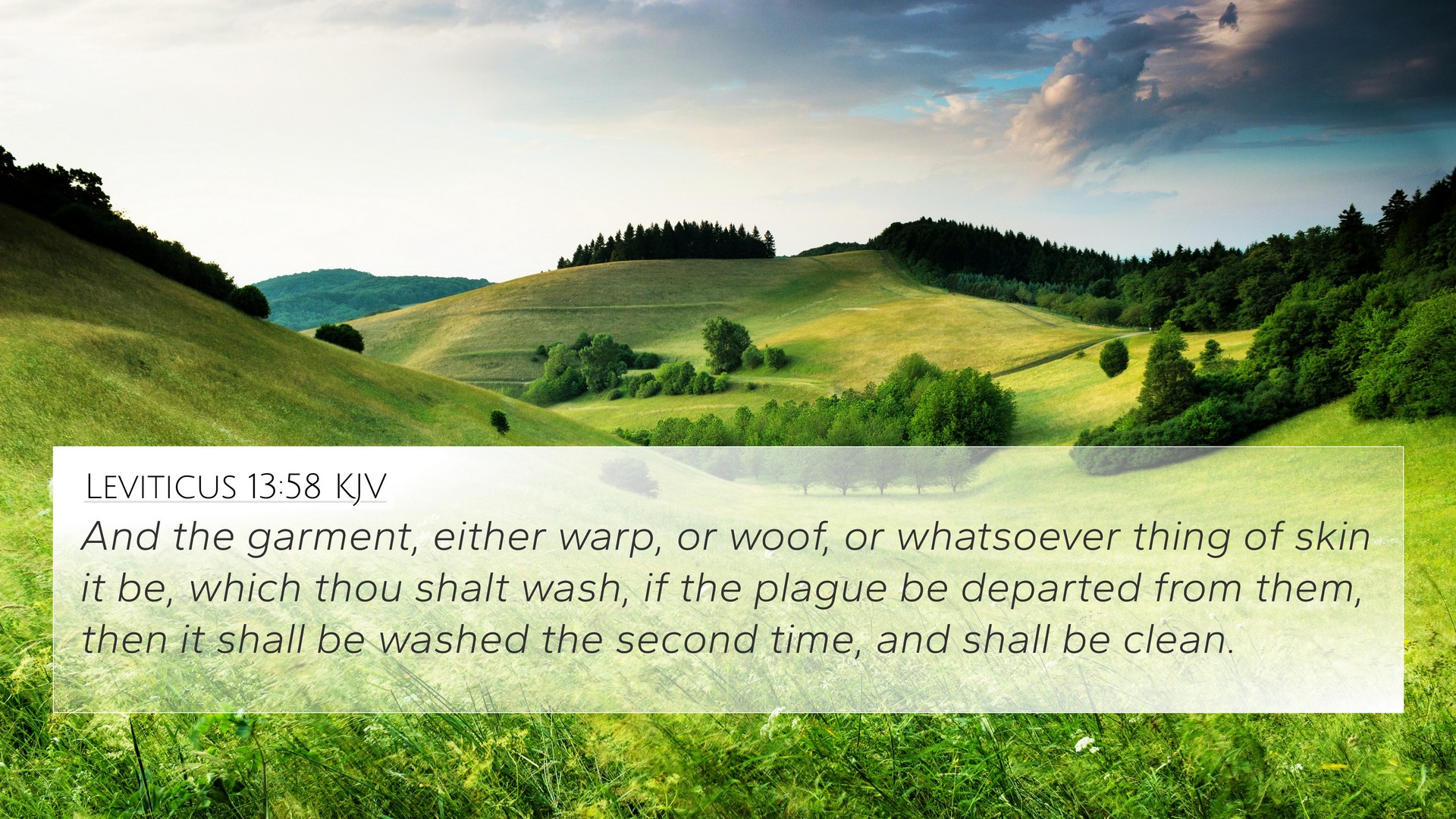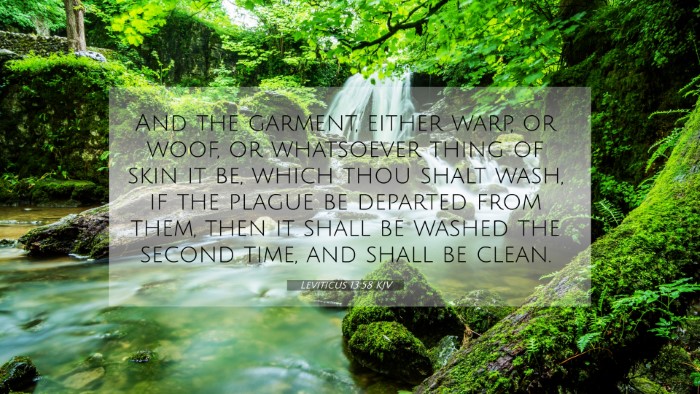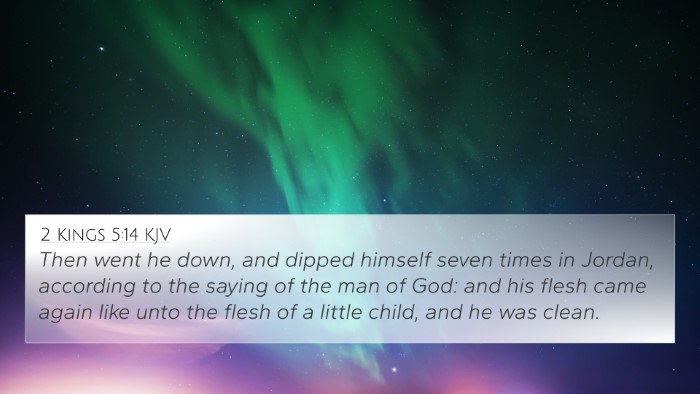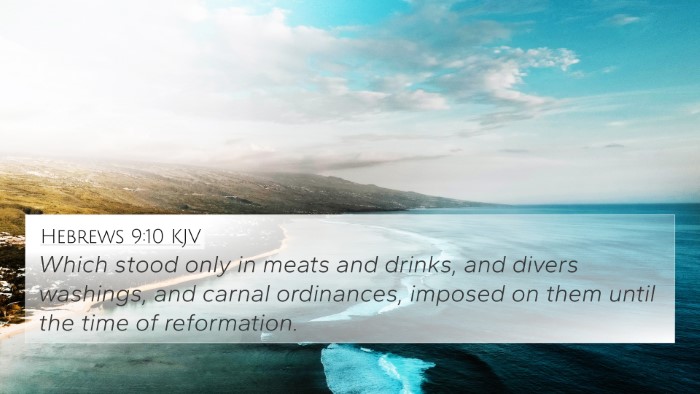Understanding Leviticus 13:58
Verse Context: Leviticus 13:58 states:
"But if the cloth on which the plague has come is washed, then it shall be washed the second time, and it shall be clean." (Leviticus 13:58)
The central focus of this verse is on the process of cleansing garments that have been contaminated by the plague, illustrating the theme of purity and cleansing in Israelite law.
Summary of Interpretations
This verse highlights biblical principles concerning ritual cleanliness, hygiene, and spiritual symbolism. Its implications extend far beyond the immediate context of fabric and mold, touching on broader themes of sin and purification.
Insights from Commentaries
-
Matthew Henry's Commentary:
Henry emphasizes the necessity of purification to maintain spiritual and ceremonial cleanliness. He notes that just as physical clothing can be contaminated, so can the spiritual life of individuals. The act of washing symbolizes restoration and renewal.
-
Albert Barnes's Notes:
Barnes discusses the practical aspect of the verse, highlighting the importance of cleanliness in daily life. He connects this instruction to greater themes of holiness in the Israelite community and depicts God’s concern for the meticulous observance of laws pertaining to cleanliness and health.
-
Adam Clarke’s Commentary:
Clarke interprets the act of washing as a sign of God’s mercy and the possibility of redemption. He sees the washing process as reflective of the spiritual cleansing one undergoes through repentance and God’s forgiveness.
Relationship to Other Scriptures
Leviticus 13:58 connects to several other biblical texts that underline themes of cleanliness, both physically and spiritually. Here are some key cross-references:
- Exodus 30:17-21: Discusses the importance of cleanliness in the tabernacle service.
- Deuteronomy 23:12-14: Provides guidelines for maintaining camp purity among Israelite soldiers.
- Psalms 51:7: David cries out for cleansing, illustrating the deep spiritual necessity of being made clean before God.
- Hebrews 9:13-14: References the cleansing of the body and conscience through Christ, aligning Old Testament cleansing practices with New Testament redemption.
- 1 John 1:9: Encourages believers to confess their sins, promising purification from all unrighteousness.
- Isaiah 1:18: Offers an invitation to be cleansed, demonstrating God's desire for reconciliation with His people.
- Matthew 5:8: "Blessed are the pure in heart," which connects the internal purification of the heart with the external symbol of cleanliness.
Thematic Connections
This verse epitomizes several theological themes:
- Purity and Holiness: Reflects the stringent standards God set for His people.
- Redemption: Illustrates the process by which people are cleansed from sin.
- Community Standards: Emphasizes the necessity of maintaining purity in society.
Importance of Cross-Referencing
Understanding the interconnectedness of various scriptures enriches the study of the Bible. Through the lens of cross-referencing Biblical texts, believers can uncover deeper meanings and applications in their lives. Here are a few guiding principles for utilizing cross-references effectively:
- Identifying Key Themes: By linking verses thematically, readers can see God's consistent message across the scriptures.
- Building a Comprehensive Understanding: Contextual studies benefit from viewing verses in light of one another, enhancing understanding.
- Enhancing Sermon Preparation: Pastors and teachers can draw on relevant cross-references to support their messages.
Tools and Resources for Bible Cross-Referencing
To effectively explore the links between different Bible verses, consider utilizing the following resources:
- Bible Concordance: A comprehensive index of words and phrases found throughout scripture.
- Bible Cross-Reference Guide: Provides systematic references to connect scriptures throughout the Bible.
- Cross-Reference Bible Study Guides: Structured formats for exploring themes using cross-references.
- Online Bible Study Tools: Many platforms allow for advanced search options that help in finding related verses.
Conclusion
Leviticus 13:58 encapsulates significant spiritual truths regarding cleansing, both physical and spiritual. By cross-referencing this verse with others across the canon, believers gain enriched insights into God's desire for purity, resulting in deeper faith and understanding. Embrace these connections as tools for personal growth and communal insight.









